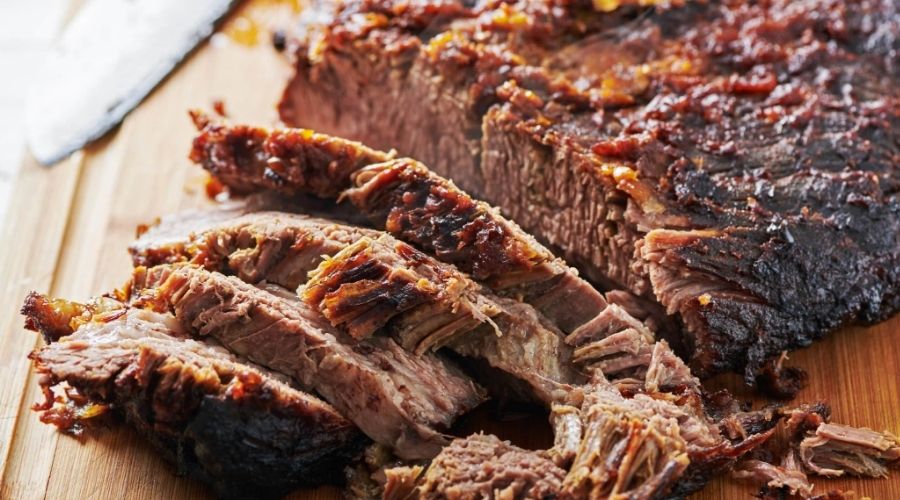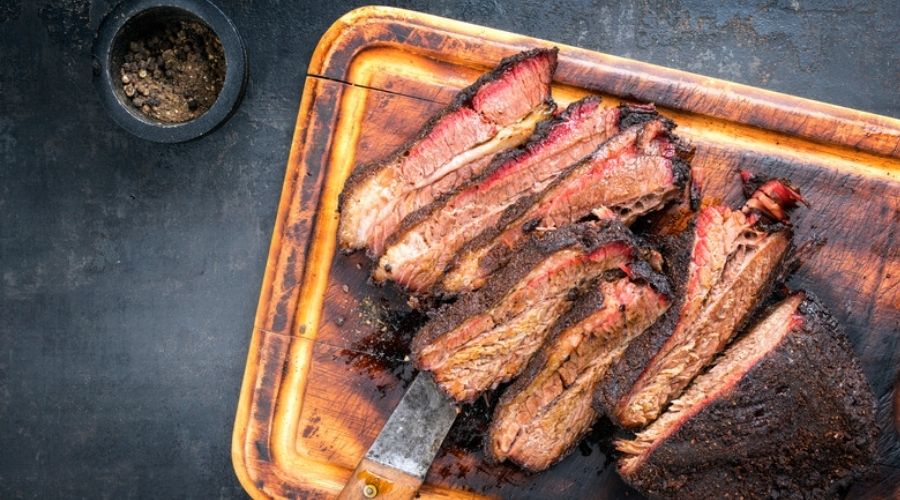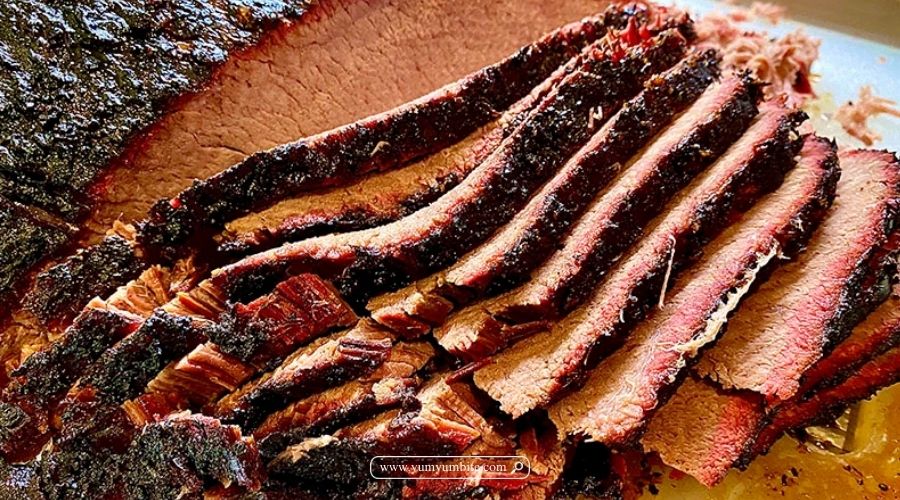Cooked brisket is a culinary delight, prized for its rich flavor and tender texture.
Whether you’ve just finished a family gathering or are preparing for meal prep, knowing how to store cooked brisket properly can make all the difference in preserving its quality and taste.
Improper storage can lead to dried-out meat or spoilage, diminishing the joy of enjoying this savory cut later on.
In this article, we’ll provide you with essential tips and techniques for storing cooked brisket, ensuring that you can savor its deliciousness long after it’s been cooked.
Why Storing Cooked Brisket Properly Matters
Storing cooked brisket properly is crucial for maintaining its rich flavor, tenderness, and overall quality.
Brisket is a prized cut of meat known for its deep, smoky taste and melt-in-your-mouth texture, often achieved through slow cooking methods like smoking or braising.
If not stored correctly, brisket can quickly lose its desirable characteristics, becoming dry and tough.
Proper storage techniques, such as refrigeration or freezing, help preserve the meat’s juiciness and prevent spoilage, extending its shelf life and ensuring you can enjoy it later without compromising quality.
Additionally, understanding the importance of proper storage minimizes food waste, allowing you to savor every last bite of this delicious dish.
By taking the time to store cooked brisket correctly, you ensure that each meal remains a flavorful and satisfying experience.
Complete Guide on How to Store Cooked Brisket

Storing cooked brisket properly is essential to maintain its flavor and tenderness, allowing you to enjoy this delicious cut of meat long after it’s been cooked.
Here’s a comprehensive guide on how to store cooked brisket effectively.
1. Cool the Brisket
After cooking, allow the brisket to cool at room temperature for about 30 minutes.
This cooling period helps to prevent condensation from forming in the storage container, which can lead to moisture buildup and compromise the meat’s texture.
2. Slice or Leave Whole
Decide whether to slice the brisket before storing it. Keeping the brisket whole can help retain moisture, but if you plan to use it in smaller portions, slicing it can make reheating more convenient.
If you choose to slice it, ensure the pieces are not too thin, as thicker slices tend to retain moisture better during storage.
3. Wrap It Up
Wrap the brisket tightly in plastic wrap or aluminum foil to minimize air exposure.
If you’re storing sliced brisket, place layers of wax paper or parchment between the slices to prevent sticking and maintain moisture.
4. Use an Airtight Container
For added protection, place the wrapped brisket in an airtight container.
This extra layer of sealing helps to lock in flavors and prevent the meat from absorbing any odors from the refrigerator.
5. Refrigerate or Freeze
If you plan to consume the brisket within a few days, store it in the refrigerator, where it will remain fresh for about 3 to 4 days.
For longer storage, freeze the brisket. Properly wrapped, it can last up to 3 months in the freezer without losing quality.
6. Thawing and Reheating
When you’re ready to enjoy your stored brisket, if frozen, thaw it in the refrigerator overnight.
For reheating, consider using an oven at a low temperature or gently warming it on the stovetop. This method helps to keep the brisket moist and flavorful.
7. Check for Freshness
Before consuming stored brisket, always check for any signs of spoilage, such as off smells or unusual textures.
If anything seems off, it’s better to err on the side of caution and discard it.
By following these guidelines, you can ensure that your cooked brisket stays delicious and ready to enhance your meals, allowing you to enjoy this delectable dish at its best for days to come.
Proper storage not only preserves quality but also provides the convenience of having tasty brisket on hand whenever you crave it.
What to Look for While Storing Cooked Brisket
When storing cooked brisket, several key factors can help ensure that it remains fresh and flavorful.
First and foremost, it’s essential to let the brisket cool down to room temperature before wrapping it or placing it in a container.
This prevents moisture buildup, which can lead to sogginess.
Next, consider the storage method. Use airtight containers or wrap the brisket tightly in plastic wrap or aluminum foil to minimize air exposure.
This is crucial for preventing the brisket from drying out or absorbing unwanted odors from the refrigerator.
Pay attention to the temperature of your storage environment.
Cooked brisket should be stored in the refrigerator if you plan to eat it within a few days, or in the freezer for longer-term storage.
If freezing, ensure the brisket is well-wrapped to avoid freezer burn, which can negatively affect its texture and taste.
Lastly, keep an eye on the storage duration.
Cooked brisket can last up to 3 to 4 days in the refrigerator and about 3 months in the freezer.
Regularly checking for any signs of spoilage, such as off smells or changes in texture, is vital for ensuring the quality of your stored brisket.
By being mindful of these factors, you can effectively store cooked brisket and enjoy its rich flavors and tenderness long after it’s been prepared.
How to Choose the Right Accessories for Storing Cooked Brisket

Selecting the right accessories for storing cooked brisket is essential to preserve its flavor, texture, and quality.
Here are some considerations to guide your choices:
1. Airtight Containers
Invest in high-quality airtight containers made of glass or BPA-free plastic. These containers are ideal for storing brisket as they prevent air exposure, which can lead to drying out and loss of flavor.
Choose a size that accommodates the brisket without too much extra space, reducing the amount of air inside.
2. Plastic Wrap or Aluminum Foil
If you prefer wrapping your brisket, use heavy-duty plastic wrap or aluminum foil. Ensure that the brisket is tightly wrapped to minimize air contact.
This method is particularly useful if you’re storing leftover slices or smaller portions.
3. Freezer-Safe Bags
For long-term storage, freezer-safe resealable bags are an excellent option.
They are designed to withstand freezing temperatures and help prevent freezer burn.
When using these bags, remove as much air as possible before sealing to maintain the quality of the brisket.
4. Parchment or Wax Paper
If you’re slicing the brisket before storage, consider placing layers of parchment or wax paper between the slices.
This prevents them from sticking together, making it easier to separate portions when you’re ready to reheat.
5. Labels and Markers
Labeling your containers or bags with the date of storage is a practical step.
Using a permanent marker or pre-made labels helps you keep track of how long the brisket has been stored, ensuring you consume it while it’s still fresh.
6. Thermometers
For those who prioritize food safety, having a food thermometer can be beneficial.
This ensures that your brisket is reheated to a safe temperature, especially when it’s been stored for a while.
By carefully selecting these accessories, you can effectively store cooked brisket, retaining its deliciousness and ensuring that it’s ready for your next meal.
Proper storage not only enhances convenience but also helps you enjoy this flavorful dish to the fullest.
How to Tell If Cooked Brisket Is Bad After Storing
Determining whether cooked brisket has gone bad is essential for food safety and ensuring an enjoyable meal.
Here are key indicators to look for:
1. Smell
A sour or off odor is one of the first signs that cooked brisket has spoiled. Fresh brisket should have a rich, savory aroma.
If you detect any unpleasant or unusual smells, it’s best to discard the meat.
2. Texture
Check the texture of the brisket. It should be tender and moist.
If it feels slimy or excessively dry, it may be past its prime.
Spoiled brisket can develop a tacky or greasy texture, indicating that it should not be consumed.
3. Appearance
Examine the brisket for any visible signs of spoilage. Fresh brisket typically has a consistent color, while spoiled brisket may show discoloration, such as dark spots or an unappealing gray hue.
Mold growth is another clear sign that the brisket has gone bad and should be discarded.
4. Storage Duration
Keep track of how long the brisket has been stored. In the refrigerator, cooked brisket is best consumed within 3 to 4 days.
If it has been stored longer than this, even if it looks and smells fine, it’s safer to err on the side of caution and dispose of it.
5. Taste
If the brisket passes the smell and texture tests but you’re still uncertain, you can taste a small piece.
If it tastes sour or off in any way, it’s advisable to throw it away rather than risk foodborne illness.
By paying attention to these signs, you can ensure that your stored cooked brisket remains safe to eat and delicious.
When in doubt, it’s always better to prioritize safety and discard any questionable meat.
1. How long can I store cooked brisket in the refrigerator?
Cooked brisket can be stored in the refrigerator for 3 to 4 days.
Ensure it’s properly wrapped or in an airtight container to maintain its freshness.
2. Can I freeze cooked brisket?
Yes, you can freeze cooked brisket.
Wrap it tightly in plastic wrap or aluminum foil, then place it in a freezer-safe bag or container. It can last up to 3 months in the freezer.
3. Should I slice the brisket before storing it?
You can choose to slice the brisket before storing, but keeping it whole helps retain moisture.
If you do slice it, layer parchment paper between the slices to prevent sticking.
4. How should I reheat stored cooked brisket?
To reheat brisket, you can use an oven set to a low temperature or warm it gently on the stovetop.
This helps maintain its moisture and tenderness.
5. Is it safe to eat cooked brisket after a week in the fridge?
No, it’s not safe to eat cooked brisket after a week in the fridge. For safety, consume it within 3 to 4 days. If you need to keep it longer, freeze it instead.
6. How can I tell if stored brisket has gone bad?
Check for signs like off smells, a slimy texture, discoloration, or mold. If it shows any of these signs, it’s best to discard it.
7. What’s the best way to prevent freezer burn on cooked brisket?
To prevent freezer burn, wrap the brisket tightly in plastic wrap or foil and place it in a freezer-safe bag, removing as much air as possible before sealing.
This helps maintain its quality during storage.
Conclusion
Storing cooked brisket correctly is vital for maintaining its flavor and tenderness, allowing you to enjoy this delicious dish at its best for days to come.
By following the right practices, such as cooling it properly, using airtight containers, and being mindful of storage duration, you can extend the shelf life of your brisket and minimize waste.
Whether you’re reheating leftovers for a quick meal or incorporating brisket into new recipes, proper storage ensures that every bite remains just as delicious as the first.
With these guidelines, you can confidently keep your cooked brisket fresh and ready for your next culinary adventure.
References
- https://girlandthekitchen.com/melt-in-your-mouth-oven-cooked-brisket/
- https://www.strandquistfamilyfarm.com/blog/how-to-cook-beef-brisket-in-the-oven
- https://www.recipetineats.com/slow-cooker-beef-brisket-with-bbq-sauce/
- https://themom100.com/recipe/oven-baked-beef-brisket/
- https://www.thekitchn.com/recipe-slow-cooker-brisket-and-onions-recipes-from-the-kitchn-45437


